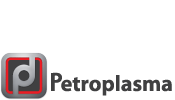Petroplasma
Plasma-arc modification of metal surfaces
After many years of research and development work plasma modification technology has been reached the appropriate stage to be used in industrial applications. Today, the company offers a wide range of plasma-arc instruments for cleaning and coating.
Petroplasma is involved in several joint projects with some of the largest manufacturers in Russia, aimed at introducing plasma modification technology into industrial operations.
Joint Project with Gazprom

Petroplasma is working with Gazprom transgas Saint-Petersburg to develop a mobile installation for treatment of main pipelines under field conditions.
The team has developed plasma-arc modules, which are fundamentally different from plasma torches, saws and other plasma tools used in the welding and soldering of metals.
This new instrument will be able to strip old insulation out of the pipe better than any other tool has ever been able to. Simultaneously, it will prepare the treated surface for the deposition of a new ptotective coating.
Plasma-Arc Module (PAM)
For pipe cleaning, individual plasma electrodes are assembled around the pipe in a plasma-modular cluster (PMC). PMC equipped with an autonomous power source is designed for a field operation and can be delivered to the pipeline on a mobile platform.
Pilot field and laboratory testing on the new plasma-arc module are due to be completed by mid-2012 in the third quarter of 2012.
Joint Project with Sinarsky Pipe Works

Sinarsky Pipe Works produces a wide range of pipes for the oil industry. Petroplasma is working with Sinarsky Pipe Works (owned by Pipe Metallurgical Company (TMK)) to develop an automatic plasma cleaning line used to remove scale and contaminants from tubes and pipes.
This project is working to replace the chemical surface-pickling of metal products, done with fluorinated acids, with Petroplasma’s environmentally friendly technology.
Using plasma technology in pipe production:
- Prevents the chemical pickling with fluorinated acids, which is both harmful for humans and dangerous technological operation;
- Reduces the need to produce harmful fluorinated acids, which are most often consumed in the metallurgical industry.
- Reduces poisonous fluorine-containing waste.
Construction and field tests of the production line are due to be completed by mid-2012.

Petroplasma ZAO
16 Kosaya lin., build. 30, lit. "A", 199106, St.Petersburg, Russia
Tel.: +7 (812) 622-04-63

